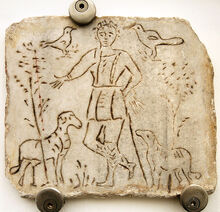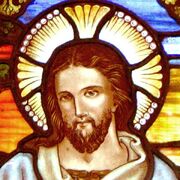List of ecumenical councils[]
Council of Jerusalem[]
The Acts of the Apostles records the Council of Jerusalem, which addressed the tension between maintaining Jewish practices in the early Christian community with Gentile converts. Although its decisions are accepted by all Christians[1] and later definitions of an ecumenical council appear to conform to this sole biblical Council, no Christian church includes it when numbering the ecumenical councils.

Fourth-century inscription, representing Christ as the Good Shepherd.
The first seven Ecumenical Councils[]
- 1. First Council of Nicaea (325) repudiated Arianism and adopted the original Nicene Creed, fixed Easter date; recognized primacy of the sees of Rome, Alexandria and Antioch and granted the See of Jerusalem a position of honor.
- 2. First Council of Constantinople (381) repudiated Arianism and Macedonianism, revised the Nicene Creed in regard to the Holy Spirit
- 3. Council of Ephesus (431)
repudiated Nestorianism, proclaimed the Virgin Mary as the Theotokos ("Birth-giver to God", "God-bearer", "Mother of God"), repudiated Pelagianism, and reaffirmed the Nicene Creed.
This and all following councils are not recognized by the Assyrian Church of the East.- Second Council of Ephesus (449) declared Eutyches orthodox and attacked his opponents.
Though originally convened as an Ecumenical council, this council is not recognized as Ecumenical by anyone and denounced as a Robber Council by the Chalcedonians (Catholics, Eastern Orthodox, Protestants).
- Second Council of Ephesus (449) declared Eutyches orthodox and attacked his opponents.
- 4. Council of Chalcedon (451) repudiated the Eutychian doctrine of monophysitism, adopted the Chalcedonian Creed, which described the hypostatic union of the two natures of Christ, human and divine. Reinstated those deposed in 449 and deposed Dioscorus of Alexandria. Elevation of the bishoprics of Constantinople and Jerusalem to the status of patriarchates.
This and all following councils are rejected by the Oriental Orthodoxy. - 5. Second Council of Constantinople (553) repudiated the Three Chapters as Nestorian, condemned Origen of Alexandria, decreed Theopaschite Formula.
- 6. Third Council of Constantinople (680-681) repudiated Monothelitism and Monoenergism.
- Quinisext Council, also called Council in Trullo[2] (692) addressed matters of discipline (in amendment to the 5th and 6th councils) and established the Pentarchy.
The Ecumenical status of this council was repudiated by the western churches.
- Quinisext Council, also called Council in Trullo[2] (692) addressed matters of discipline (in amendment to the 5th and 6th councils) and established the Pentarchy.
- 7. Second Council of Nicaea (787) restored the veneration of icons (condemned at the Council of Hieria, 754) and repudiated iconoclasm.
This council is rejected by some Protestant denominations, which condemned the veneration of icons.
The Eighth Ecumenical Council[]
- 8. (RC) Fourth Council of Constantinople (869-870) deposed Patriarch Photios I of Constantinople as an usurper and reinstated his predecessor Saint Ignatius. Photius had already been declared deposed by the Pope, an act which the Church of Constantinople accepted at this council. After the death of Ignatius, Photius was reinstated as Patriarch with papal approval.
Today, this council is accepted by the Roman Catholic Church but rejected as a robber council by the Eastern Orthodox Church. - 8. (EO) Fourth Council of Constantinople (879-880) restored Photius to the See of Constantinople and condemned the double-procession doctrine concerning the Holy Spirit.
Today, this council is accepted by the Eastern Orthodox Church but not regarded as Ecumenical by the Roman Catholic Church.
Ecumenical for some Eastern Orthodox[]
The next two are regarded as ecumenical by some in the Eastern Orthodox Church but not by others, who instead consider them to be important local councils. They have nevertheless received universal acceptance by all Eastern Orthodox Churches even where their ecumenicity is not recognized.
- Fifth Council of Constantinople (1341-1351) affirmed hesychastic theology according to Gregory Palamas and condemned the Barlaam of Seminara.
- Synod of Jerusalem (1672) defined Orthodoxy relative to Roman Catholicism and Protestantism, defined Biblical canon.
Roman Catholic Councils #9 to #21[]
- 9. First Council of the Lateran (1123) addressed investment of bishops and the Holy Roman Emperor's role therein.
- 10. Second Council of the Lateran (1139) reaffirmed Lateran I, addressed clerical discipline (dress, marriages).
- 11. Third Council of the Lateran (1179) restricted papal election to the cardinals, condemned simony, introduced minimum ages for ordination (thirty for bishops)
- 12. Fourth Council of the Lateran (1215) defined transubstantiation, addressed papal primacy and clerical discipline.
- 13. First Council of Lyon (1245) deposed Emperor Frederick II, levy to support the Holy Land.
- 14. Second Council of Lyon (1274) attempted reunion with the Eastern churches, approved Franciscan and Dominican orders, tithe to support crusade, conclave procedures.
- 15. Council of Vienne (1311-1312) disbanded Knights Templar.
- Council of Pisa (1409)
attempt to solve the Great Western Schism
The council is not numbered because it was not convened by a pope and its failed solution was repudiated at Constance.
- Council of Pisa (1409)
- 16. Council of Constance (1414-1418) solved the Great Western Schism, condemned John Hus, beginnings of conciliarism.
- Council of Siena (1423-1424) addressed church reform.
Not numbered as it was swiftly disbanded.
- Council of Siena (1423-1424) addressed church reform.
- 17. Council of Basel, Ferrara and Florence (1431-1445)
addressed church reform and reunion with the Eastern Churches, split into two parties:
The fathers remaining at Basel became the apogee of conciliarism. The fathers at Florence achieved union with various Eastern Churches and temporarily with the Eastern Orthodox Church. - 18. Fifth Council of the Lateran (1512-1514) addressed church reform.
- 19. Council of Trent (1545-1563, with interruptions) addressed church reform and repudiated Protestantism, defined role and canon of Scripture, the seven sacraments, strengthened clerical discipline and education.
Though temporarily attended by Protestant delegates, this and the following councils are rejected by Protestants. - 20. First Vatican Council (1870; officially, 1870-1960)
defined pope's primacy in church governance and his infallibility, repudiated rationalism, materialism and atheism, addressed revelation, interpretation of scripture and the relationship of faith and reason.
This and the following councils are rejected by the emerging Old Catholic Church. - 21. Second Vatican Council (1962-1965)
addressed pastoral and disciplinary issues dealing with the Church and its relation to the modern world, including liturgy and ecumenism.
This council is rejected by some traditionalists.
- ↑ Karl Josef von Hefele's commentary on canon II of Gangra notes: "We further see that, at the time of the Synod of Gangra, the rule of the Apostolic Synod with regard to blood and things strangled was still in force. With the Greeks, indeed, it continued always in force as their Euchologies still show. Balsamon also, the well-known commentator on the canons of the Middle Ages, in his commentary on the sixty-third Apostolic Canon, expressly blames the Latins because they had ceased to observe this command. What the Latin Church, however, thought on this subject about the year 400, is shown by St. Augustine in his work Contra Faustum, where he states that the Apostles had given this command in order to unite the heathens and Jews in the one ark of Noah; but that then, when the barrier between Jewish and heathen converts had fallen, this command concerning things strangled and blood had lost its meaning, and was only observed by few. But still, as late as the eighth century, Pope Gregory the Third 731 forbade the eating of blood or things strangled under threat of a penance of forty days. No one will pretend that the disciplinary enactments of any council, even though it be one of the undisputed Ecumenical Synods, can be of greater and more unchanging force than the decree of that first council, held by the Apostles at Jerusalem, and the fact that its decree has been obsolete for centuries in the West is proof that even Ecumenical canons may be of only temporary utility and may be repealed by disuser, like other laws."
- ↑ The appellation "troullos" (Latin trullus, dome) comes from a dome-roofed palace in Constantinople, where the council was hosted.
